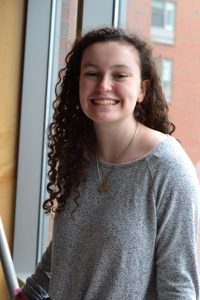People who keep koi fish care a lot about their carp.
“The koi person is a very specific kind of person,” says Eva Quigley ’22 (CANHR), a nutritional sciences major from New Milford who didn’t start her summer knowing much about the big, brightly colored, decorative fish that are popular additions to ornamental ponds and gardens, or about the people who keep them. “People who own koi fish really, really love koi fish. They’re very dedicated to keeping their fish beautiful, and they tend to really care about what they’re feeding their koi.”
Natalie Lacroix ’22 (SFA) from Mililani, Hawaii, agrees – koi people want what’s best for their fish.
“Koi people are passionate individuals who really care about their fish,” says Lacroix, who is studying web and interactive media through UConn’s Digital Media and Design program, “and they want to put the needs of their fish first, whether that be through making sure they have the right nutritional content, making sure they’re energetic, they’re growing.”
Learning about “koi people” – their likes and dislikes, and their priorities when it comes to caring for their fish – was just one part of the experiential learning project that Lacroix and Quigley embarked on this summer through the pilot cohort of VentureWerx – a six-week program that pairs entrepreneurial-minded students with a startup company that could benefit from a diverse and skilled team.
Lacroix and Quigley were both part of a four-person team that worked with Pisces Atlantic, a company founded by UConn undergraduate student Peter Goggins that is working to manufacture and sell higher quality fish foods. The VentureWerx team specifically focused on products meant for koi fish and koi people.

“All of us went in not knowing a lot about koi fish and koi people, and learning how much they care for their fish really helped us see how are we going to market to them, what type of language are we going to use to talk with them, and what social media platforms are going to work best for them,” says Lacroix, who served as the project manager for her VentureWerx team. “All that research really helped when we were trying to apply the brand persona later.”
VentureWerx is the brainchild of rising senior Patrick Hocking ’21 (ENG), a biomedical engineering student from Middletown, Conn., and member of the inaugural cohort of Werth Innovators – student ambassadors for entrepreneurship and innovation through the Peter J. Werth Institute for Entrepreneurship & Innovation. In a previous project called Greenhorn, he said he had taken on roles that traditionally would have taken significant education and background.
“We were able to learn on the fly and still find success,” Hocking says. “Many other students have the same capability, if given the opportunity.”
Hocking later was recruited by Werth Institute Director David Noble to manage a consulting-like project working with a small team and an alumni startup, and the two began talking about how a similar project could be implemented in a more organized way.
The resulting VentureWerx pilot became a reality this year with support from the Werth Institute; VentureWerx will be housed with the Connecticut Center for Entrepreneurship and Innovation (CCEI) if it is made a permanent offering to students.
“We have students across all schools with creative energy that they really don’t have outlets for at the moment, and what Werth does is give students the confidence to put that energy into solving real problems,” says Hocking. “VentureWerx is part of a broader movement to recognize that not every entrepreneur is the employee number one, Silicon Valley, visionary type, but instead come in all shapes, sizes, and personalities.”
Noble said that VentureWerx is unique in that most entrepreneurial programs have a tremendous amount of oversight and rules guiding student activity and projects.
“In these pilots we have simply activated the students, set out a number of goals, and let them accomplish them,” he says.
For the Pisces Atlantic team, the freedom the program offered was at first daunting, especially as all the team members were working remotely during the pandemic – and managing the practical challenges of time difference, with Lacroix at home in Hawaii. But in the midst of a quarantine, they rose to the challenge.
“I think everybody went in not quite knowing what to expect from this,” says Lacroix. “We walked out definitely gaining new knowledge, but also happy to apply what we had previously learned.”

The team identified four main deliverables to help guide the growing startup – they began with qualitative and quantitative market research, including conducting a survey of koi people, and then built a brand persona and developed an effective implementation for online commerce.
“The founder gave us a lot of control,” says Quigley. “The members who were working on branding and website development and the logo, he gave them a lot of creative control, which was really nice. We didn’t have to just follow a guideline, necessarily.”
Lacroix says the client was ultimately happy with the work the group provided and even hired one team member as an employee of the startup. The VentureWerx experience made her more confident in her abilities as a leader and taught her the importance of open communication when working in a team, especially in a virtual environment, she says.
“I feel like we got really close over the course of the six weeks,” Lacroix says. “I don’t know quite when it happened, but it went from being professional coworkers together to being pretty good friends.”
She continued, “Being able to work with a diverse group of individuals who have a like-minded skill set is one of the best things I’ve done at UConn. You really can just put together all of these different skills and come out with these incredible results, and that’s what I like about the Werth Institute. All of us come from different majors, even different years, different places, and we just have this similar mindset – we want to create, we want to learn, we want to be something more and do more. And that’s what the Werth Institute gives us a platform to do.”
The experience was inspiring for Quigley, allowing her to see what it was like to start a business as a student.
“It’s never really something I considered until I was involved with the Werth Institute and with VentureWerx,” Quigley says. “While I’m studying nutrition, there’s definitely the thought in the back of my mind that I could start my own nutrition-related business or something like that because of the work I’ve done. It’s interesting to see how someone so young and still a student is able to run this business – it’s given me a lot of inspiration.”
Noble says that VentureWerx aligns with the “life-transformative education” that the Werth Institute is working to make available to students at UConn.
“We started this because we have a vision of students helping students, and we know that there are students out there that want to be part of entrepreneurial teams,” says Noble. “The entrepreneur gets a building block of their nascent enterprise built with very little relative interaction by extremely talented students. Students again learn those skills, but they also learn about interesting things, like koi fish! It brings their education into practice.”



